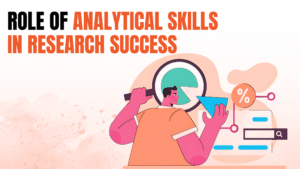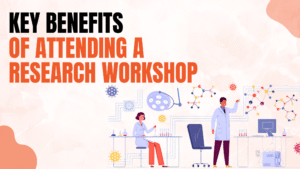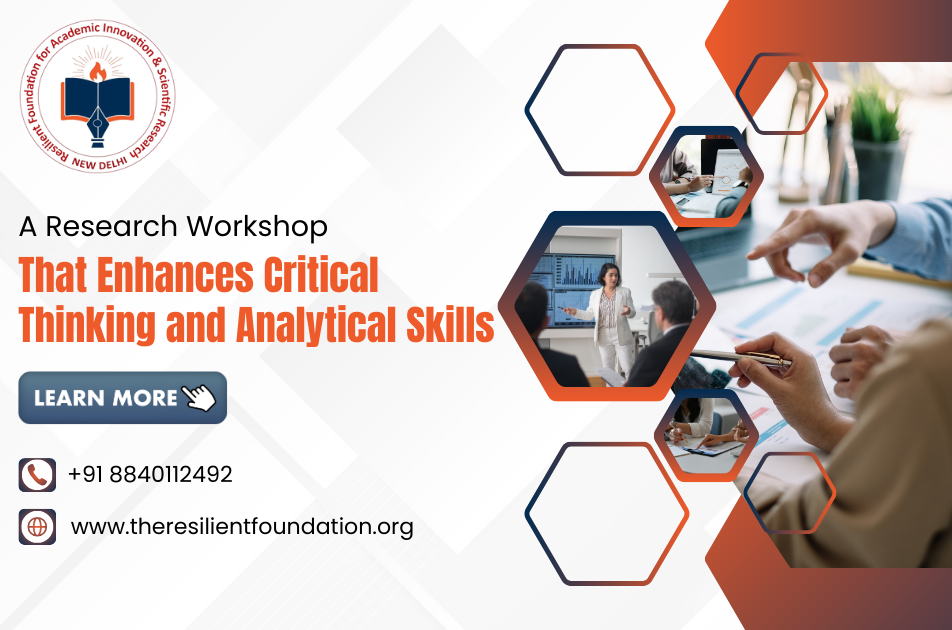A research workshop is not only about learning from books. It is a place where people learn how to think better, ask smart questions, and clearly solve problems. In simple steps, it shows how to look at ideas from a new side. This makes the learning more useful and easier to apply in real life. If people start developing a research plan early and in the right way, they save time and stay more focused. Because of that, such workshops are helpful not only for students but also for working people who want to grow in their careers.
Importance of Critical Thinking in Research
In research, critical thinking is like the base of a strong house. Without it, data and facts remain just numbers and words. But with it, people can find true meaning and new answers. Some main reasons are:
- Better Decision-Making: A person who uses critical thinking checks every detail, studies carefully, and then makes a choice. Thus, this makes analytical research more strong and correct.
- Identifying Gaps: Critical thinking helps to see what is missing in a study. Because of that, people can ask new questions and do more useful work.
- Clear Understanding: By asking “why” and “how,” learners connect facts with meaning. This improves and strengthens their research and development work.
- Problem Solving: With this skill, big problems can be broken into small parts. So, even hard tasks become easier to solve step by step.
So, critical thinking is not just a skill. It is a habit that makes research clearer and effective.
Role of Analytical Skills in Research Success

Along with critical thinking, analytical skills are also very important. Analytical research is about looking at data and finding answers logically. Thus, these skills play a big role in research:
- Data Accuracy: A researcher may collect lots of data, but errors can happen. Analytical skills help check the data carefully, so the results are right.
- Statistical Insights: With statistical analysis in research, numbers are not just numbers. They show patterns and trends that help in making strong points.
- Logical Thinking: Analytical skills keep each step linked with reason. If steps are logical, the whole study becomes more powerful.
- Evidence-Based Work: These skills make sure results are based on proof, not opinion. This also supports stronger research collaboration with others.
Therefore, analytical skills change raw data into clear knowledge that everyone can trust.
How a Research Workshop Builds These Skills
A research workshop trains people step by step. It mixes learning with practice so that ideas are easier to understand. Here is how it builds skills:
- Hands-On Practice: Instead of only reading, people do exercises and case studies. This practice makes learning stronger and more clear.
- Guided Planning: Experts guide participants in developing a research plan. They show how to set goals, timelines, and methods simply.
- Real Examples: Workshops share real case studies. These examples show how analytical research works in daily life and real projects.
- Data Handling: Sessions give practice with statistical analysis in research, so learners feel confident about using numbers and tools.
In addition, workshops give space for questions and answers, which supports new ideas and research and development.
Key Benefits of Attending a Research Workshop

A research workshop gives many long-term benefits. It helps in studies, career, and personal growth. Some of the main benefits are:
- Boost in Confidence: After joining, people feel ready to do their own projects. They understand analytical research and can apply it alone.
- Better Collaboration: Workshops bring different people together. This makes research collaboration easy and more productive.
- Practical Knowledge: People practice real tools and methods, not just read theory. This gives them useful skills.
- Professional Growth: If someone knows statistical analysis in research, they have more career options. This skill is needed in many fields.
- Creative Ideas: Meeting mentors and peers builds new ideas. This is important for progress in research and development.
So, workshops give not only knowledge but also skills that help in the future.
Features of an Effective Research Workshop
For a research workshop to make a big impact, it must have strong features. At Resilient Foundation, every workshop is planned with care. These features are:
- Expert Guidance: Trainers are experienced and explain even hard topics of analytical research in simple words.
- Interactive Methods: Sessions are full of talks, group work, and teamwork. So, this makes research collaboration easy and natural.
- Practical Training: Learners practice statistical analysis in research with real data and tools. This gives them confidence.
- Structured Modules: Every part of the session follows a clear plan. Thus, this helps people in developing a research plan without confusion.
- Supportive Environment: Resilient Foundation gives a friendly space where learners feel safe to ask and share. Thus, this culture supports new ideas and strong research and development results.
Because of that, Resilient Foundation makes sure each workshop is not only about learning but also about building real skills for the future.

